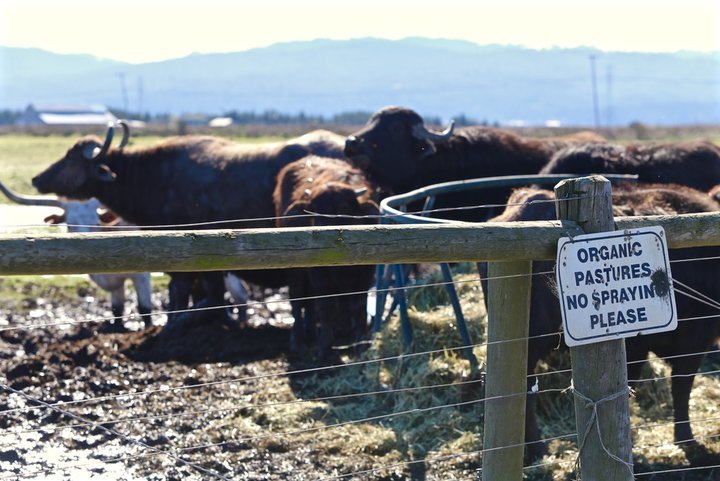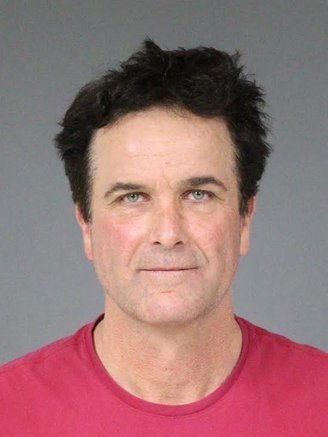
Photo taken the day of the raid on Christie’s ranch off Samoa Boulevard.
###
Arcata rancher Ray Christie, on trial for alleged animal cruelty and dumping cow carcasses near state waters, illegally removed ear tags from cows so he could pass them off as “organic,” the trial prosecutor told Judge Christopher Wilson on Friday.
“We believe Mr. Christie removed all official ID tags as part of a scheme to disguise conventional cows as organic,” Deputy District Attorney Adrian Kamada said during arguments outside the jury’s presence.

Christie.
During the trial, defense attorney John Cogoran has made an issue out of the district attorney’s failure to provide the history of cows Christie bought at the Fortuna livestock auction. The prosecution wants the jury to understand why.
Jurors have been led to believe that “the People could have (tracked the cows’ history) but failed to do so through laziness or negligence,” said the co-prosecutor, Deputy District Attorney David Moutrie. “ … Removing tags is a violation of state and federal law.”
Cogoran responded he had never mentioned ear tags, only the glued-on tags that are placed on cows when they are auctioned. Video taken of some cows in Christie’s barn shows those tags on the backs of the animals, he said, which indicates they had just been delivered from the auction and arrived in already-poor condition.
Wilson denied the prosecution’s request to admit the evidence, though he said he recalled Cogoran asking some questions about ear tags.
“We have facts and we have conclusions,” the judge said. “This witness (state veterinarian Steven Gallego) can testify to facts. He can’t testify to conclusions.”
Gallego was one of two state veterinarians who were part of a multi-agency raid on Christie’s properties in March 2018. One of the items of evidence, seized by county livestock Deputy Travis Mendes, was a five-gallon bucket containing orange and silver ear tags.
With the jury back in the courtroom, Gallego testified the orange ear tags signify the animal has been vaccinated against the disease brucellosis, and the metal silver tags are meant to be in the cow’s ear from birth to death. He said removing the tags is a federal offense.
Jurors have seen photos and video of dead and dying animals on Christie’s various properties throughout the county. On Friday Gallego was questioned about two nearly dead cows that were part of a herd on property off Park Street in Eureka. The land is surrounded by Freshwater Slough.
Both pictured cows were black with white faces. Both were on the ground and too weak to stand up, and both were “skin and bones,” as Gallego pointed out.
One of the cows, the worst-off of the two, was covered in ulcers and had lost most of her hair. Neither animal had access to food and water, Gallego testified, and the grass, “if you can call it grass,” was down to nothing.
During cross-examination, Cogoran suggested the two dying cows could have wandered there from another property. Cows are able to jump fences, he noted, and gates are sometimes left open.
“You don’t know whose cow that is,” he said.
“No.”
Fifty to 100 cows were on the parcel. Gallego said up to 90 percent of the herd appeared to be suffering from malnutrition.
“Did you see any carcasses?” Kamada asked him.
“Lots.”
Up to 160 rotting carcasses were piled up at Christie’s ranch on Jackson Ranch Road near Arcata. (The defense says it was under 40).
Fourteen corpses were discovered on the bank of the Mad River in McKinleyville, and more were found on properties off Clam Beach Road and South G Street in Arcata.
No witness has been able to specify cause of death or time of death for any of the animals. They were in various stages of decay, from fairly fresh to piles of bones.
Humboldt County no longer has a rendering plant to deal with the carcasses.
Testimony in the trial is expected to continue Monday morning.
###
PREVIOUSLY:
- Cops Raid Notorious Ranch in the Arcata Bottoms; Rancher Ray Christie Arrested at the Scene
- More Than 250 Dead Cows Found on Ray Christie’s Properties, Says HCSO; Numerous Other Alleged Violations Discovered
- Humboldt-Del Norte Cattlemen’s Association Calls Ray Christie’s Ranch ‘Horrific,’ Says Anyone Convicted of Animal Abuse Should be Punished to the ‘Greatest Extent Possible’
- Judge Says Ray Christie, Arcata Rancher Accused of Animal Cruelty, Can Still Own Livestock For Now
- OP-ED: Ban Rancher Ray Christie from ‘Caring’ for Animals
- Rancher Ray Christie Held to Answer for Three Felony Charges of Animal Abuse; Four Charges Dropped After Investigating Deputy’s Testimony Was Compromised
- Arraignment for Accused Animal Abuser Ray Christie Postponed; Goose Still in Custody
- Judge Reverses Own Decision in Christie Animal Cruelty Case; Arraignment Set For Next Month
- CRASH, BANG, BUSTED! Here Are the Top 25 Lost Coast Outpost Posts of 2018, as Measured by Site Traffic
- Calling State Law ‘Unconstitutional,’ Attorneys for Rancher Ray Christie Ask Judge to Throw Out Case Involving Hundreds of Cattle Carcasses Found on His Land
- Ray Christie’s Lawyer Says: First They Came For Ray Christie, and You Did Not Speak Out Because You are a Vegetarian
- CHRISTIE CASE: Judge Denies Defense Motion; Rules That Case Against Rancher Accused of Animal Cruelty, Cattle Corpse-Dumping May Proceed
- TODAY in COURT: Trial of Rancher Raymond Christie Set to Start Later This Month; Torture, Murder Suspect Declines to Show for Hearing
- ‘Nothing But a Show’ Rancher Ray Christie’s Attorney Says After Jury Shown Images of Numerous Dead or Dying Cows
- CHRISTIE TRIAL: Defense Attorney Attacks Investigating Deputy’s Credibility
CLICK TO MANAGE